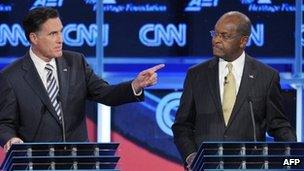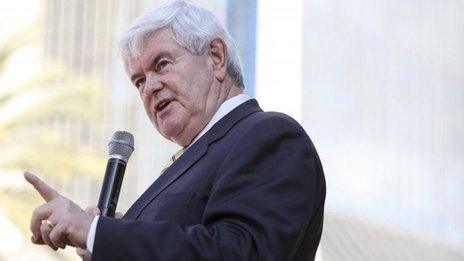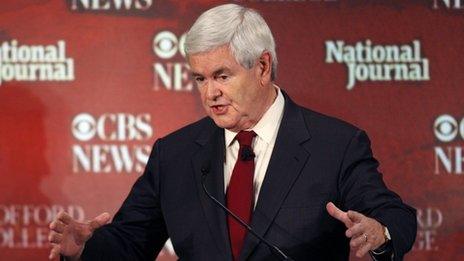Republican debate sorts grown ups from kids
- Published

Mitt Romney and Herman Cain: Eager to show they did their homework
Herman Cain did better than Mitt Romney in the latest Republican presidential candidates' debate.
The Herminator merely got some one else's name wrong, calling CNN's moderator Wolf Blitzer, "Blitz".
Mitt Romney in a jokey aside confirmed his first name is "Mitt", external. Only it's not. It's Willard. Mitt is his middle name.
This bit of silliness aside, the debate was by far the most interesting so far.
Real, substantial differences between the candidates were exposed. There was something of a sorting of the grown ups from the kids. I doubt there will be any clear agreement on winners and losers but it was a serious test of ability.
The debate was mainly on national security and nearly all of the candidates showed a tendency to eagerly disgorge a flood of facts to demonstrate their prowess.
But Perry and Cain seemed like schoolboys who had desperately mugged up on their homework and had memorised a couple of facts, but clearly hadn't been paying attention in class all year.
By contrast Michele Bachmann had her best performance for a while. She was fluid and clearly did know what she was talking about.
Former Utah governor Jon Huntsman was masterful and joined the dots, for all the good it will do him.
Romney was measured and informed but not the hands down winner he has been in just about every other encounter. Indeed he was a bit windy.
The only solid priority I heard was to make a trip to Israel his first visit as president.
Righteous fury
I though this night would be all about Newt Gingrich, but it wasn't. He was solid, but almost retiring, offering little that was memorable or powerful.
But he confirmed again, what to me is his most attractive feature, that he thinks outside the box and has big thoughts about technology.
He said the biggest undiagnosed danger to national security was an EMP pulse, external.
It makes more sense than Rick Santorum's claim that the unspotted danger was Hezbollah in South America, external.
Ron Paul was passionate, and was the only one clever enough not to feel the need to show off.
He was clear and consistent in his difference from the other candidates. He's a libertarian rather than a conservative, and really does believe in less government, not just less redistribution. His foreign policy could be summed up in one of his phrases: "Why don't we mind our own business?"
He was against what he calls "endless wars", thinks foreign aid is pointless and that the Patriot Act is unpatriotic.
He all but exploded with righteous fury when Gingrich and others insisted that the presumption of innocence and criminal justice was only for proper criminals, not terrorists. Oh, and he would end the war on drugs and allow states to legalise marijuana, treating just like alcohol.
This early clash was just for starters.
Romney called out Huntsman on his backing for the reduction of troops in Afghanistan and then prodded him about it. Huntsman gave as good as he got, winning the encounter by insisting the commander-in-chief (ie the president), not the commanders on the ground should make the final decision.
Perry and Bachmann sparred over aid to Pakistan. Explaining why she wouldn't cut it, the congresswoman called the Texas governor "highly naive". She looked as though she had studied the problem and wasn't pandering to easy applause. He looked, well, naive.
There were no real gaffes, although Cain's plan to impose sanctions against Syria's oil industry would be less than effective as it has more or less ground to a halt because of existing sanctions, external.
This debate probably won't change many minds, but Newt didn't seem to build on his surge in the polls, and for once Willard didn't win.
- Published2 May 2012

- Published17 November 2011
